The Talented Mr. Ripley Blu-ray Movie
HomeThe Talented Mr. Ripley Blu-ray Movie 
Warner Bros. | 1999 | 139 min | Rated R | Sep 10, 2013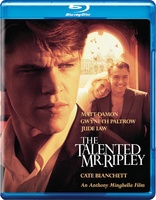
Movie rating
7.4 | / 10 |
Blu-ray rating
| Users | 4.1 | |
| Reviewer | 4.5 | |
| Overall | 4.3 |
Overview
The Talented Mr. Ripley (1999)
Tom Ripley is a calculating young man who believes it's better to be a fake somebody than a real nobody. Opportunity knocks in the form of a wealthy U.S. shipbuilder who hires Tom to travel to Italy to bring back his playboy son, Dickie. Ripley worms his way into the idyllic lives of Dickie and his girlfriend, plunging into a daring scheme of duplicity, lies and murder
Starring: Matt Damon, Gwyneth Paltrow, Jude Law, Cate Blanchett, Philip Seymour HoffmanDirector: Anthony Minghella
| Drama | Uncertain |
| Psychological thriller | Uncertain |
| Period | Uncertain |
| Thriller | Uncertain |
| Crime | Uncertain |
Specifications
Video
Video codec: MPEG-4 AVC
Video resolution: 1080p
Aspect ratio: 1.78:1
Original aspect ratio: 1.85:1
Audio
English: DTS-HD Master Audio 5.1 (48kHz, 24-bit)
French: Dolby Digital 5.1 (640 kbps)
Spanish: Dolby Digital 2.0
Subtitles
English SDH, French, Spanish
Discs
50GB Blu-ray Disc
Single disc (1 BD)
Playback
Region free
Review
Rating summary
| Movie | 4.5 | |
| Video | 4.5 | |
| Audio | 5.0 | |
| Extras | 3.5 | |
| Overall | 4.5 |
The Talented Mr. Ripley Blu-ray Movie Review
Hidden Talents
Reviewed by Michael Reuben September 7, 2013After winning the Best Director Oscar for The English Patient at age 43, Anthony Minghella only lived to direct three more films, dying of post-surgical complications in 2008. Two of the three, The Talented Mr. Ripley (1999) and Cold Mountain (2003), were successful, though not without criticism. Minghella's final film, Breaking and Entering (2006), remains a mystery that no one could fathom. Over time, however, I believe that Ripley will emerge as Minghella's most accomplished work next to The English Patient. At its release, it suffered by comparison to French writer/director René Clément's Purple Noon, a taut and sleeker adaptation of Patricia Highsmith's original novel, starring Alain Delon as a smooth and deadly Tom Ripley. Minghella departed significantly from Highsmith's text, reconceiving Ripley, situating his story in a lush recreation of Italy in the late Fifties, and adding a new character whose role expanded during filming as Minghella watched Cate Blanchett bring his new creation to life. Both before and after the release of Ripley, Minghella was frank about what attracted him to Highsmith's con man. In Tom Ripley, Minghella saw elements of the childhood sense of exclusion he experienced growing up as the son of Italian immigrants who owned an ice cream factory on the Isle of Wight, a popular British resort destination. Minghella repeatedly spoke of both Ripley and his youthful self as people with their nose pressed up against the glass, peering at a life they ardently desired but could not have. What happens, Minghella asks, when a determined young man with a talent for deceit finds the door to that life suddenly flung open? How will he react? How far will he go to remain inside? In reorganizing Highsmith's plot around these themes, Minghella created a film that is difficult to categorize. In his commentary, he calls it "a strange mix of pathos and farce". Ripley was marketed as a thriller, and much of it plays like one. It's also the story of an elaborate con, where your sympathies vacillate between the con man and his victims. In a typical con film, the "mark" deserves to be swindled, usually through greed, but Ripley's victims are just living their lives, albeit somewhat carelessly. Are they to blame, or is Ripley—and does it matter? As Ripley says, everyone always makes sense to themselves. "No matter what you do, no matter how awful, no one ever thinks that they're a bad person." One could call Ripley a story about "identity theft", but not in the contemporary sense of impersonating someone to steal their money. Tom Ripley isn't interested in money per se; he's interested in the kind of person you can be when you don't have to worry about getting it. Unlike those who treat money as a measure of achievement, Ripley sees it as a means to acceptance, attention, an end to the invisibility that has plagued his existence. Or in Ripley's succinct formulation: "I always thought it would be better to be a fake somebody than a real nobody."
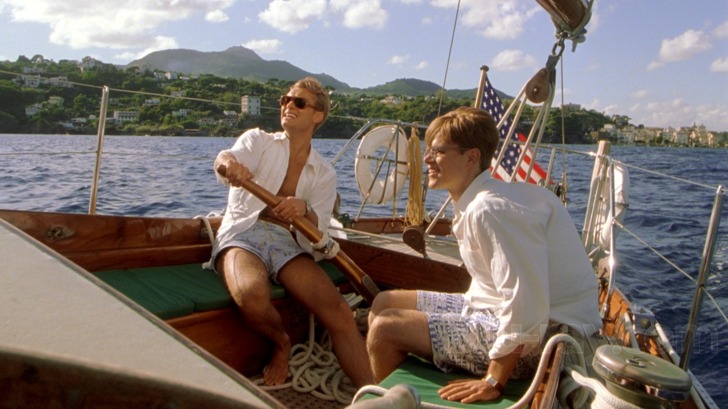
We learn nothing of Tom Ripley's (Matt Damon) background, but in 1958 he's struggling to make a living in New York City as a men's room attendant. He plays classical piano, and one afternoon he substitutes as an accompanist at an afternoon function attended by the cream of society. A borrowed Princeton blazer leads shipping magnate Herbert Greenleaf (James Rebhorn) to mistake Tom for a classmate of Herbert's son, Dickie (Jude Law), who is frittering away his life in Italy. In a fateful decision, Tom plays along with Mr. Greenleaf's mistake and soon finds himself traveling first class to Europe at Greenleaf's expense, tasked with persuading Dickie to return home. Tom studies Dickie like a swindler researching his mark, training himself in Dickie's favorite music, jazz, and learning as much about his history at Princeton as he can from yearbooks. He finds him in tranquil seaside Mongibello, relaxing with his upper crust girlfriend, Marge Sherwood (Gwyneth Paltrow), and meeting for secret assignations with a local girl, Silvana (Stefania Rocca). Dickie is Tom's opposite: handsome, assured, born with a silver spoon and happy to live for the moment. "My father builds boats, and I sail them", he says. Dickie accepts Tom's assertion that they knew each other at Princeton and lets Tom insinuate himself into his and Marge's life. He treats his privileged life with the careless certainty of someone who knows he can do as he pleases—and get away with it. For a brief honeymoon period—the phrase is appropriate, because the homoerotic undercurrents are explicit—Tom Ripley is intoxicated by what he thinks is his new life. He moves in with Dickie and Marge, and together they spend what Mr. Greenleaf is paying Tom for his living expenses. He sings with Dickie in jazz clubs, lives "la dolce vita" with Dickie and Marge, keeps Dickie's guilty secrets about Silvana and closely studies how Dickie speaks, acts and dresses. (When asked, Tom readily admits that his greatest talents are for lying, impersonation and forging handwriting.) Tom doesn't realize that he's just a visitor in Dickie's world, but the truth hits him hard with the arrival of another member of Dickie's set, Freddie Miles (Philip Seymour Hoffman). Unlike Dickie Greenleaf, Freddie is not careless about privilege. He zealously guards the dividing line between his own set and the rest of the world, and he spots Tom instantly as a member of the hoi polloi who belongs on the other side of the velvet rope. Through Freddie's eyes, Dickie reevaluates Tom and decides it's time to part. Parting with Tom Ripley turns out not to be a simple task, because he has fallen deeply in love, not so much with Dickie as with the idea of Dickie and the life he represents. Rejected lovers often react violently, and Tom begins a series of increasingly desperate and elaborate efforts to cling to the new life for which he's now acquired an almost chemical addiction. He applies all his talents of deceit and discovers new capabilities, including a capacity for violence. It's here that Minghella's musical metaphor come to fruition, as Dickie and Tom trade places. Where Tom began as the rigid classicist, while Dickie was devoted to the improvisational freedom of jazz, it's Tom who becomes the great improviser in matters of identity, readily reinventing himself on the spot as the situation requires. The most frequent cause of Tom's reinvention is Cate Blanchett's Meredith Logue, the character that Minghella added to the story. Daughter of a wealthy American family, she meets Tom by chance when they arrive together in Europe, and on impulse he introduces himself as "Dickie Greenleaf". Throughout Ripley, Meredith keeps crossing paths with Tom, usually at moments when it would be especially awkward (even possibly fatal) for someone to address Tom as "Dickie". The elaborateness of the lies that Tom has to spin for Meredith's sake, and the conviction of his performances, have led some viewers to call him a sociopath, but at least in Minghella's film, Tom Ripley is not so easy to categorize. Right down to the film's chilling conclusion, he seems to have genuine feelings. It's just not clear what they are. Matt Damon has given many fine performances, including his three appearances as Jason Bourne, but he has never been better in a dramatic role than in The Talented Mr. Ripley. His Ripley is simultaneously compelling and repugnant, a deep well of emotions and an inscrutable cipher, a tragic hero and a monster you're glad to leave behind. That Damon manages to embody all these qualities, and still have viewers concerned when the Italian police or the efficient detective (Philip Baker Hall) hired by the Greenleaf family get too close, is a rare achievement.
The Talented Mr. Ripley Blu-ray Movie, Video Quality 
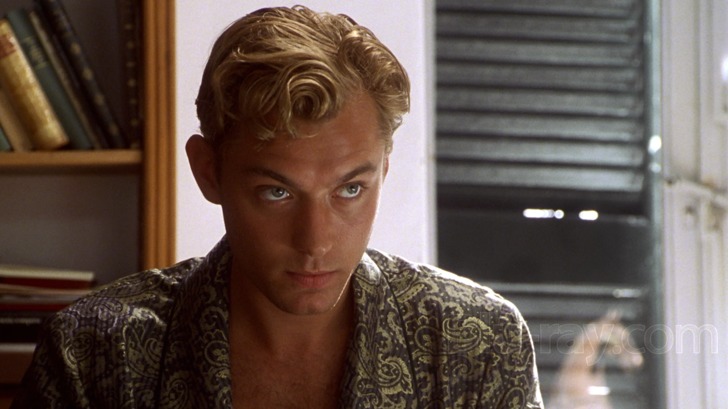
The transfer used for this 1080p, AVC-encoded Blu-ray released by Warner under license with Paramount is different from that featured on the Region B Blu-ray released by Optimum Home Entertainment earlier this year. That transfer was framed at 1.85:1, while this one, consistent with Warner's usual practice, has been opened up slightly to 1.78:1. Minghella worked with his English Patient collaborator John Seale, who won an Oscar for that film's cinematography, and despite the challenging weather conditions in Italy (described by Minghella in his commentary), Seale delivered one of the most romantically colorful recreations of late Fifties Italy in modern film. The Blu-ray's palette delivers an impressive balance between the brightly saturated hues of the jazz clubs and the impassioned Roman night life and the more delicate hues of the gorgeous countryside in and around Mongibello (for which various locations were used). Consistent with the film's dreamy style, the texture is soft, but detail is plentiful, and the film grain is fine but natural. Blacks in night scenes or on the occasional tuxedo are solid, and contrast is never overstated to the point of washing out fine detail. The average bitrate of 25.95 is well within the acceptable range for an action film, which Ripley isn't, but I suspect that every bit was necessary for the magnificent locations. (Almost none of the film was shot on soundstages.)
The Talented Mr. Ripley Blu-ray Movie, Audio Quality 
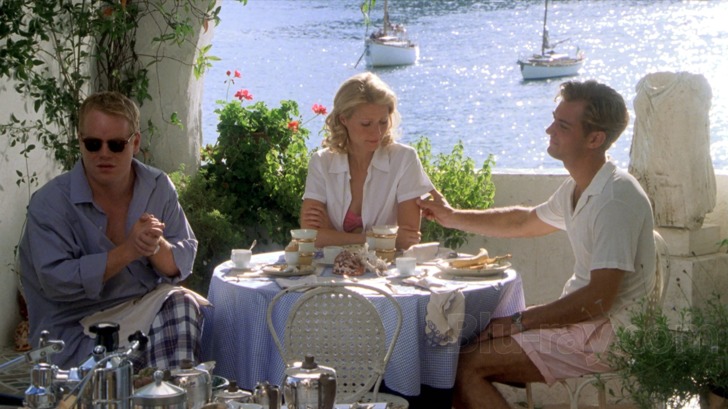
The same sound team that won an Oscar for The English Patient oversaw Ripley, including the film's legendary editor, Walter Murch. Murch's touch can be heard in the many layers of tiny, almost subliminal sounds and the sonic overlap of scenes so that you begin to hear the next scene while the previous one is concluding. The Blu-ray's lossless DTS-HD MA 5.1 track reproduces the original theatrical mix with both authority and subtlety, whether it's the combination of wind, sea and singing during a religious ceremony on the beach, or the uproarious surroundings in a jazz club where Tom and Dickie get up on stage and perform together, or simply the waves rocking a boat during a fateful trip taken by two characters. Ripley's complex musical score is well served by the Blu-ray's track, which provides presence and wide dynamic range for the unusual blend of classical music, jazz and Gabriel Yared's original score which effectively shifts between the intense longing that drives Tom Ripley and the growing threat that his longing poses to those around him.
The Talented Mr. Ripley Blu-ray Movie, Special Features and Extras 

The extras have been ported over from Paramount's 2000 DVD of The Talented Mr. Ripley, but a few items did not survive the trip. Missing in action are the two music videos for "My Funny Valentine" and "Tu Vuo' Fa L'Americano". The same extras were included on the Region B Blu-ray released by Optimum Home Entertainment earlier this year.
- Commentary with Director Anthony Minghella: Minghella is an engaging and informative commentator, and he provides substantial information about the script (e.g., that the opening forty pages in New York had to be condensed into a few minutes), casting decisions, location shooting and various departures from the novel. Minghella is frank about the particular themes that attracted him to Highsmith's novel and that he chose to highlight in his adaptation, as well as the roots of those themes in his own life.
- Inside The Talented Mr. Ripley (480i; 1.33:1; 22:34): This is an unusually thorough "making of" documentary, for its length, that includes interviews with Minghella, Law, Damon, Paltrow, Blanchett, Hoffman and producers William Horberg, Tom Sternberg and Sydney Pollack. Of particular interest is the inclusion of shots and lines of dialogue that did not survive in the final cut of the film.
- Reflections on The Talented Mr. Ripley (480i; 1.33:1; 14:42): These were listed on the DVD as "Cast and Crew Interviews". The "reflections" intercut among Minghella, Damon, Law, Paltrow, Blanchett and Hoffman.
- The Making of the Soundtrack (480i; 1.33:1; 8:25): A portion of this featurette is devoted to the collaboration between Minghella and composer Gabriel Yared in developing the original score, a process that began during the writing of the screenplay. However, most of the running time is occupied by comments from Minghella, Damon and Law about the "debate" between classical music and jazz that sonically mimics the love/hate relationship between Tom Ripley and Dickie Greenleaf.
- Trailers (480i; 1.85:1)
- Teaser (2:10)
- Theatrical (2:34)
The Talented Mr. Ripley Blu-ray Movie, Overall Score and Recommendation 
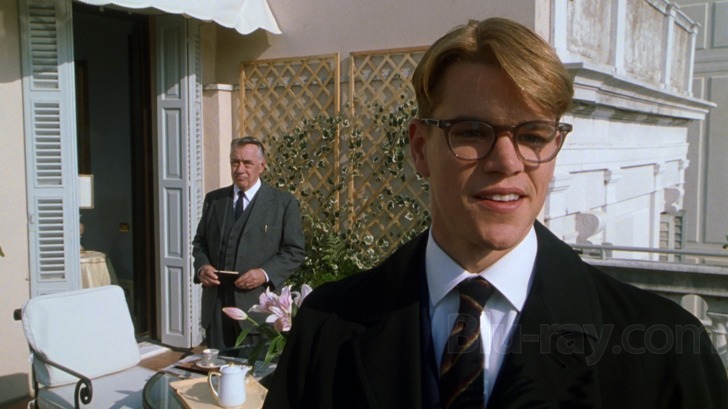
Toward the end of Ripley, Tom offers a glimpse of what appears to be a soul, when he speaks of a dark basement where he hides away his past misdeeds, except that now he's met someone to whom he'd like to grant access, if only he could find a way. Unfortunately, that very person, through no fault of their own, will eventually become a threat to Tom and take up permanent residence in his dark basement. Was Tom telling the truth about himself, or was his tale of regret just another in his seemingly endless series of charades and false identities? The closing dialogue on the soundtrack suggests the former, but the final shots of Tom Ripley's expressionless face and empty eyes say otherwise. Ripley's greatest talent is to remain unknown. Highly recommended.
Other editions
The Talented Mr. Ripley: Other Editions
Similar titles
Similar titles you might also like

The American
2010

Night Moves
2013

Child of God
2013

The Face of an Angel
2014

Taxi Driver
40th Anniversary Edition
1976

Cape Fear
1991

Straw Dogs
4K Restoration
1971

Marnie 4K
1964

The Offence
1973

The Master
2012

We Need to Talk About Kevin
2011

You Were Never Really Here
2017

First Reformed
2017

A Bigger Splash
2015

Insomnia
2002

Tom at the Farm
Tom à la ferme / English packaging / Version française
2013

Se7en 4K
Seven 4K
1995

The Comfort of Strangers
1990

Cymbeline
2014

Repulsion
1965

